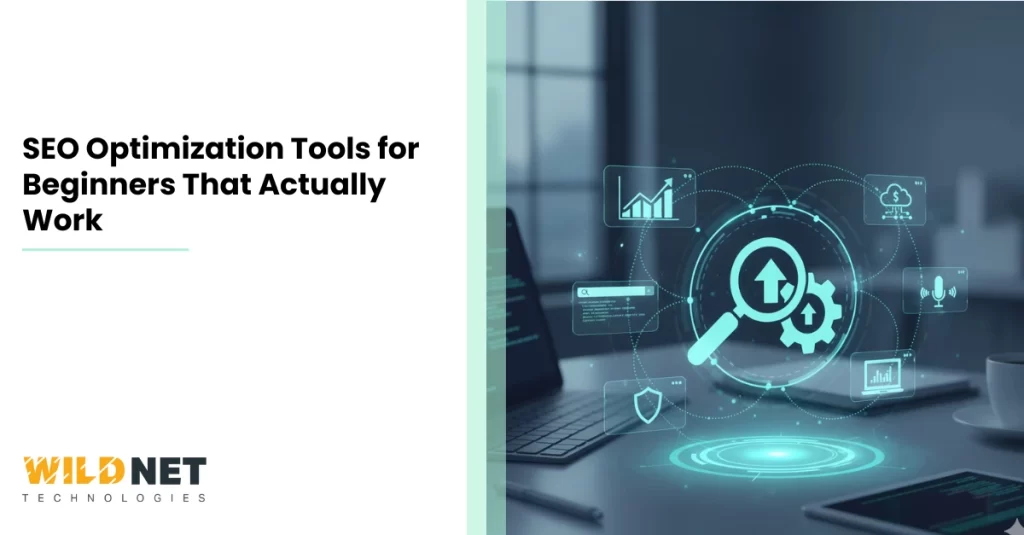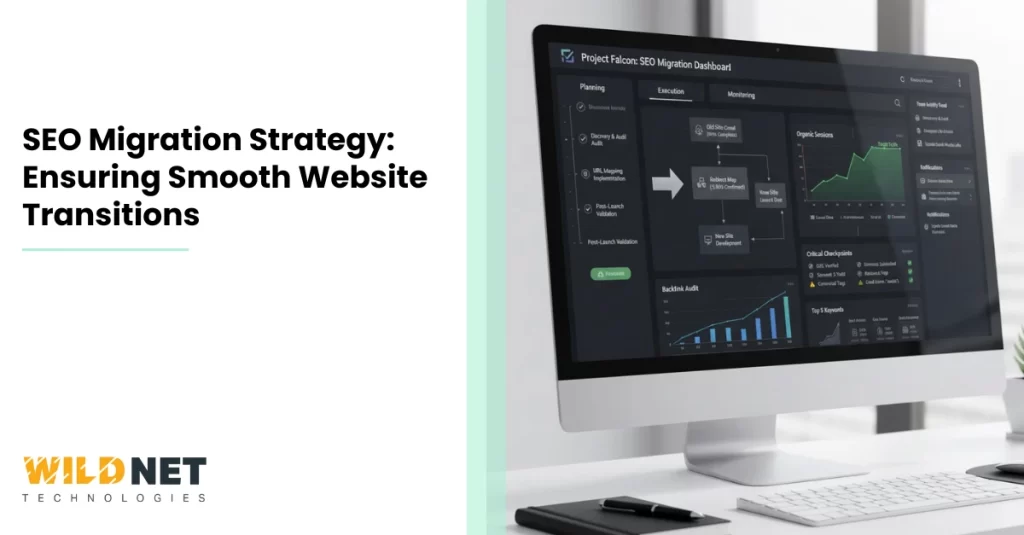So you’ve built a website or started a blog, and you want people to actually find it, right? Now, 93% of online experience begins with search engines and it’s important you appear when people need your offerings. That’s where SEO comes in. The problem is, it can seem complicated with all the fancy words and endless advice.
The good news: you don’t need to be an expert to get started. With the right SEO Optimization Tools, you can make life a lot easier.
In this post, we, as the best digital marketing services provider, will walk you through what beginners need to know, which tools to try first, and how to use them without feeling overwhelmed.
Why Use SEO Optimization Tools?

Image 1.1. Infographic showing why you should use SEO optimization tools
Before diving into tools, let’s get clear on why they matter.
- Data beats guesswork. You think a keyword is good. A tool can confirm (or challenge) that.
- Save time & avoid mistakes. Tools flag errors (broken links, missing tags, etc.) you might miss.
- Track progress. You want to know what’s improving (or not) month over month.
- See what your competitors are doing. You’ll often learn from their strategies, what’s working, what’s not.
So yes, SEO optimization tools are like having a trusted sidekick in your SEO journey.
What to Look for in Beginner SEO Tools

Image 1.2 Infographic showing which SEO tool is best for beginners
When you’re just starting, you want tools that:
- Are easy to use, with a gentle learning curve
- Offer free or freemium plans, so you can test before paying
- Cover different aspects like keyword research, site audit/technical SEO, content optimization, and analytics
- Give actionable recommendations (not just metrics)
Core Categories of SEO Optimization Tools & Beginners’ Picks
Let’s break down the major categories, and then we’ll suggest some good starting tools.
- Keyword Research & Idea Tools
- Site Audit / Technical SEO
- On-page / Content Optimization
- Backlink & Competitor Analysis
- Performance / Speed / Core Web Vitals
- Analytics & Search Console Tools
1. Keyword Research & Idea Tools
This is where most beginners start. You need to know which search queries your audience types in.
- Google Keyword Planner – A classic free tool if you have Google Ads access.
- AnswerThePublic – Generates question-based keyword ideas (e.g. “how to …”).
- Soovle – Aggregates autocomplete suggestions across search engines (Google, Bing, Amazon, etc.) and is super simple to use.
- LowFruits – Designed for beginners, especially for finding low-competition keywords. It gets praise for user friendliness in recent “best SEO tools for beginners” guides.
- SEMrush / Ahrefs Keywords Explorer – More advanced, but their freemium or trial accounts let you experiment. Backlinko lists SEMrush as a top all-in-one solution.
Tip for beginners: Always check keyword difficulty and search intent. It doesn’t help to rank for something nobody wants (or expects).
2. Site Audit / Technical SEO Tools
These tools crawl your site, find broken links, missing tags, slow pages, etc.
- Screaming Frog SEO Spider – A go-to tool for auditing site structure, broken links, redirects, etc. Featured in top SEO tools lists.
- SEOptimer – Lightweight site audit tool that gives you scores and improvement suggestions.
- Lighthouse / PageSpeed Insights (by Google) – Audits performance, accessibility, SEO factors, and more. Useful for checking Core Web Vitals.
These help you find things like:
- Missing meta titles, headings
- Broken images or links
- Slow loading pages
- Mobile usability issues
Fixing them often gives you quick wins.
3. On-page / Content Optimization Tools
Once you have topics & keywords, you need tools to help optimize your content so it can rank better.
- Yoast SEO (for WordPress) – One of the most famous plugins for on-page SEO. It gives you feedback (readability, meta tags, keyword usage) as you write.
- Rank Math – Another WordPress plugin many bloggers use (especially in 2025) for on-page SEO and easy optimization.
- Clearscope – Suggests relevant keywords and phrases and shows content optimization recommendations (this is more for serious content creators).
- Hemingway, Grammarly – Not strictly SEO tools, but help you write clearer, more readable content. Many guides on the web include them in their “content optimization tools” lists.
The idea is: don’t just stuff keywords. Make your content useful, readable, and satisfying for the user (and search engines).
4. Backlink & Competitor Analysis
Backlinks are links from other websites to yours, and they act like votes of trust that help you rank higher. These tools help you see who links to your competitors and where you might get links.
- Ahrefs – strong in backlink analysis, content gap tools, and competitor research. It’s often ranked among the top premium SEO tools.
- Moz Link Explorer – simpler, good for beginners to explore link data.
- SEMrush Backlink Analytics – part of the SEMrush suite.
- SE Ranking – good local SEO + backlink features for beginners.
Don’t obsess over quantity, focus on quality backlinks from relevant, authoritative sites.
5. Performance / Speed / Core Web Vitals
Speed, layout shifts, interactivity, these all matter. Google uses “Core Web Vitals” as ranking signals.
- Google PageSpeed Insights / Lighthouse – already mentioned above.
- GTmetrix – shows detailed breakdown of what slows your pages down.
- WebPageTest – allows deeper testing from different locations/devices.
If your site is slow, even the best content won’t rank well.
6. Analytics / Search Console Tools
These are your “reality check” tools: what’s happening, what’s working, and what’s not.
- Google Search Console – essential tool to see how Google views your site, which keywords show impressions, clickthroughs, indexing issues, etc.
- Google Analytics – see user behavior, bounce rate, traffic sources, conversions, etc.
- Microsoft Clarity or Hotjar – optional but helpful to visually see how users click, scroll, etc.
Together with your optimization tools, these tell you if your efforts are paying off.
How to Put It All Together: A Simple Workflow for Beginners
Here’s a casual, step-by-step process using SEO Optimization Tools so you don’t feel lost.
- Pick your niche / topic
Choose a general topic area (e.g. “healthy smoothie recipes”)
- Use a keyword research tool
Find 3–5 target keywords (low to medium competition)
- Run a site audit
Use Screaming Frog, SEOptimer, or Lighthouse to find technical issues
- Write content & optimize it
Use Yoast / Rank Math + content optimization tools to polish your post
- Publish & index
Submit to Google Search Console, ensure meta tags, etc.
- Promote & build links
Share on social media, guest posts, outreach
- Track & iterate
Use Search Console + Analytics to see which keywords get impressions or clicks. Use that data to update content, add internal links, or write new posts.
- Repeat
Over time, you’ll refine which tools you use, and you’ll become faster.
Tips & Mistakes to Avoid
- Don’t over-buy too soon. Start free or with affordable plans.
- Avoid “tool overload.” Using 10 tools at once will confuse you. Start with 2–3.
- Don’t rely blindly on tool suggestions. Use your judgment. Sometimes a tool’s “suggestion” doesn’t make sense for your audience.
- Content is king. Tools help, but good content, user experience, relevance, and trust matter most.
- Update old content. Use analytics to find underperforming posts and refresh them.
- Don’t ignore site speed & mobile experience. Many beginner blogs miss this, but Google cares a lot.
The Future & AI / Generative Search: What to Keep in Mind
A quick note: SEO is evolving. Search isn’t just about keywords anymore. Tools & strategies are adapting to generative AI search, answer engines, and more conversational queries (e.g. “What’s the best smoothie recipe for weight loss?” vs. “smoothie recipe weight loss”). Some of the newer tools and blog strategies are considering this shift.
So as you grow:
- Look for tools that suggest entities, semantic relevance, or question-based optimization
- Stay updated on how search engines evolve (Google’s updates, new ranking signals).
- Be ready to refine your content for user intent over exact keywords.
Wrapping It Up
If you’re just starting out, SEO doesn’t have to be scary. With the right SEO Optimization Tools, you can make smarter decisions, see what’s working, and gradually build authority.
Here’s your “starter kit”:
- Keyword research: Soovle or LowFruits
- Audit / technical: Lighthouse or Screaming Frog
- On-page: Yoast SEO / Rank Math
- Analytics / tracking: Google Search Console + Google Analytics
Start small, experiment, and build confidence. Over time, you’ll layer in more tools, deeper analysis, and more ambitious keyword goals.
If you think it’s too much to handle, you can count on Wildnet’s SEO services. Connect now.
FAQs
Question 1. What are SEO Optimization Tools and why do I need them?
Answer: SEO optimization tools are software or online services that help you do things like find good keywords, check your website for errors, track rankings, and analyze competitors. They make SEO easier by giving you data and suggestions instead of guessing.
Question 2. Which SEO tools should I start with as a beginner?
Answer: Start small. Use free or freemium tools like Google Search Console, Google Analytics, Lighthouse / PageSpeed Insights, Yoast SEO (if your site is on WordPress), and a simple keyword tool like Soovle or AnswerThePublic. Once you’re comfortable, you can explore tools like Ahrefs, SEMrush, or Screaming Frog.
Question 3. Are free SEO tools good enough, or do I need paid ones?
Answer: Free tools are great for beginners, they can cover many important tasks (site audits, basic keyword research, Google index status). Paid tools offer deeper insights, more data, advanced features, and better support. Use free ones to learn first, then upgrade when needed.
Question 4. How long before I see SEO results using these tools?
Answer: SEO is not instant. Usually, noticeable improvements may take 3 to 6 months, depending on your website’s age, competition, content quality, and consistency. Some fixes (like correcting technical issues or improving page speed) can show more immediate impact.
Question 5. Can SEO tools guarantee a top rank on Google?
Answer: No. Tools can help you optimize, find opportunities, and avoid problems, but ranking also depends on competition, your content quality, user experience, backlinks, and how search engines evolve. Think of tools as helpful assistants, not magic wands.






